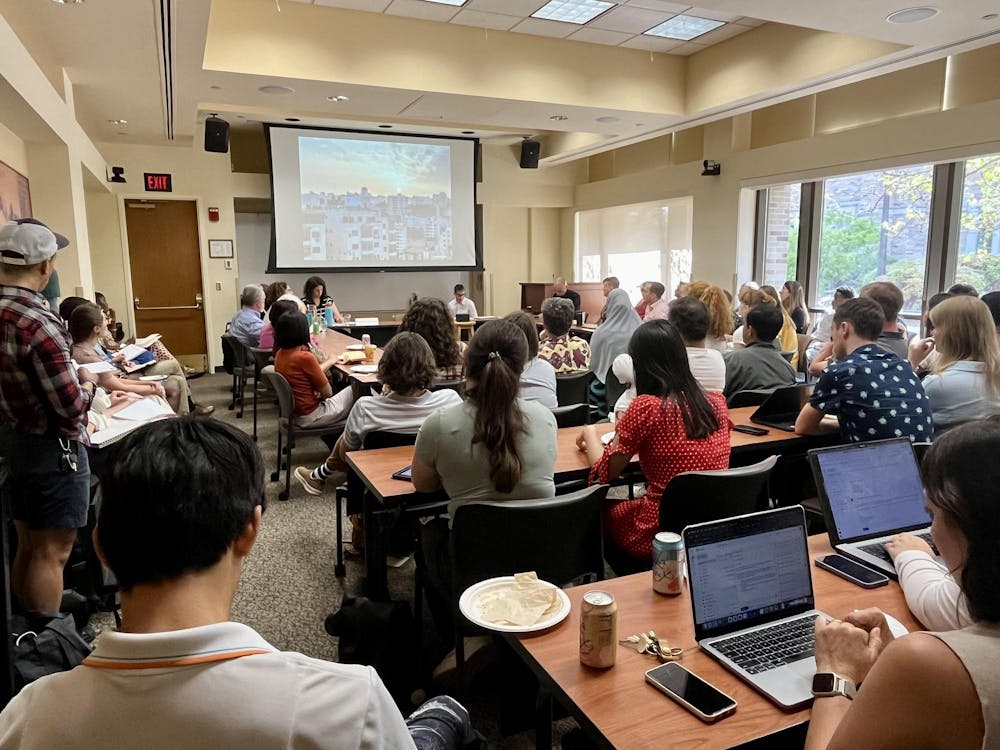On Thursday afternoon, assistant professor of geography and global studies at the University of Wisconsin-Madison Lisa Bhungalia gave a presentation at the Hesburgh Center for International Studies.
The lecture, named after Bhungalia’s 2023 book “Elastic Empire: Refashioning War Through Aid in Palestine,” centered on the United States’ role in Gaza through humanitarian aid policy. It was the first of a four-part series dedicated to American imperialism in the Middle East and North Africa, hosted in collaboration by the Kroc and Liu Institutes this academic year.
Bhungalia’s research stems from the proliferation of anti-terrorism law in the U.S. following the September 11 attacks. She has traveled to the West Bank “almost every year” since 2010 to conduct her research, interviewing Palestinians from many walks of life.
Introducing the lecture, Bhungalia said she'd focus on a “mode of war enacted from the interlacing of aid and counterterrorism law.”
She explained that Executive Order 13234, signed by president George W. Bush in the aftermath of September 11, “significantly expanded the power of the U.S. Treasury to target the financial infrastructure of terrorism, casting an ever-extensive net on who and what could be sanctioned by the U.S. government … It also broadened the scope of those targeted, from individuals directly belonging to Foreign Terrorist Organizations (FTOs), to those deemed otherwise associated.”
Bhungalia then connected this program to its impacts on foreign humanitarian aid, which is the main argument in her book.
“What that means is now, basically, humanitarian actors, NGOs, and others could be prosecuted if they provide aid to FTOs or they operate in terrorist-controlled territories,” she said.
She went on to describe challenges this policy posed to aid groups and local governments in Gaza and the West Bank seeking foreign funding. For instance, Bhungalia described an initiative involving greenhouses aimed at reducing food insecurity in Palestine. To qualify for a greenhouse, individuals were required to navigate multiple stages of approval, she explained.
During her interview research, an interviewee explained to her a greenhouse could not be installed until the beneficiary was identified through an application process, passed both technical and social criteria, is vetted by the United States Agency for International Development (USAID), approved by a local committee and lastly approved by the Coordinator of Government Activities in the Territories (COGAT), a unit in the Israeli Ministry of Defense.
Bhungalia explained in another example that Bethlehem elected a mayor who was affiliated with a group on the U.S. foreign terrorist organizations list. The U.S. therefore placed sanctions on Bethlehem to prohibit assistance for residents there. These events led to the termination of projects such as water and sewage systems repair in Bethlehem.
Another complicating factor, she added, is that “since 2007, Gaza has been governed by Hamas, which is a U.S. FTO, so no one receiving aid can be associated with civil authority.”
Following the lecture, graduate student in peace studies and history Francesca Freeman responded with questions for Bhungalia.
“Are humanitarian interventions that ultimately perpetuate war at less violent levels better or worse than a lack of intervention in which deteriorating conditions may lead to more revolutionary change?” Freeman asked.
Atalia Omer, professor at the Kroc Institute for International Peace Studies and the Keough School of Global Affairs, finished off the conversation with thoughts on Bhungalia’s talk.
“It is nice that the United States is gifting roads and whatnot, but Palestinians want freedom, not false generosity,” Omer said.










